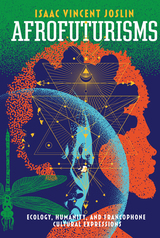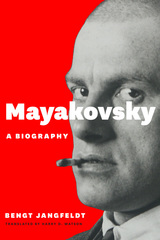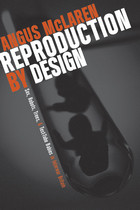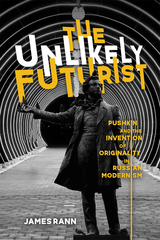4 books about Futurism (Literary movement)

Afrofuturisms
Ecology, Humanity, and Francophone Cultural Expressions
Isaac Vincent Joslin
Ohio University Press, 2023
An exploration of Francophone African literary imaginations and expressions through the lens of Afrofuturism Generally attributed to the Western imagination, science fiction is a literary genre that has expressed projected technological progress since the Industrial Revolution. However, certain fantastical elements in African literary expressions lend themselves to science fiction interpretations, both utopian and dystopian. When the concept of science is divorced from its Western, rationalist, materialist, positivist underpinnings, science fiction represents a broad imaginative space that supersedes the limits of this world. Whether it be on the moon, under the sea, or elsewhere within the imaginative universe, Afrofuturist readings of select films, novels, short stories, plays, and poems reveal a similarly emancipatory African future that is firmly rooted in its own cultural mythologies, cosmologies, and philosophies. Isaac Joslin identifies the contours and modalities of a speculative, futurist science fiction rooted in the sociocultural and geopolitical context of continental African imaginaries. Constructing an arc that begins with gender identity and cultural plurality as the bases for an inherently multicultural society, this project traces the essential role of language and narrativity in processing traumas that stem from the violence of colonial and neocolonial interventions in African societies. Joslin then outlines the influential role of discursive media that construct divisions and create illusions about societal success, belonging, and exclusion, while also identifying alternative critical existential mythologies that promote commonality and social solidarity. The trajectory proceeds with a critical analysis of the role of education in affirming collective identity in the era of globalization; the book also assesses the market-driven violence that undermines efforts to instill and promote cultural and social autonomy. Last, this work proposes an egalitarian and ecological ethos of communal engagement with and respect for the diversity of the human and natural worlds.
[more]

Mayakovsky
A Biography
Bengt Jangfeldt
University of Chicago Press, 2014
Few poets have led lives as tempestuous as that of Vladimir Mayakovsky. Born in 1893 and dead by his own hand in 1930, Mayakovsky packed his thirty-six years with drama, politics, passion, and—most important—poetry. An enthusiastic supporter of the Russian Revolution and the emerging Soviet State, Mayakovsky was championed by Stalin after his death and enshrined as a quasi-official Soviet poet, a position that led to undeserved neglect among Western literary scholars even as his influence on other poets has remained powerful.
With Mayakovsky, Bengt Jangfeldt offers the first comprehensive biography of Mayakovsky, revealing a troubled man who was more dreamer than revolutionary, more political romantic than hardened Communist. Jangfeldt sets Mayakovsky’s life and works against the dramatic turbulence of his times, from the aesthetic innovations of the pre-revolutionary avant-garde to the rigidity of Socialist Realism and the destruction of World War I to the violence—and hope—of the Russian Revolution, through the tightening grip of Stalinist terror and the growing disillusion with Russian communism that eventually led the poet to take his life.
Through it all is threaded Mayakovsky’s celebrated love affair with Lili Brik and the moving relationship with Lili’s husband, Osip, along with a brilliant depiction of the larger circle of writers and artists around Mayakovsky, including Maxim Gorky, Viktor Shklovsky, Alexander Rodchenko, and Roman Jakobson. The result is a literary life viewed in the round, enabling us to understand the personal and historical furies that drove Mayakovsky and generated his still-startling poetry.
Illustrated throughout with rare images of key characters and locations, Mayakovsky is a major step in the revitalization of a crucial figure of the twentieth-century avant-garde.
With Mayakovsky, Bengt Jangfeldt offers the first comprehensive biography of Mayakovsky, revealing a troubled man who was more dreamer than revolutionary, more political romantic than hardened Communist. Jangfeldt sets Mayakovsky’s life and works against the dramatic turbulence of his times, from the aesthetic innovations of the pre-revolutionary avant-garde to the rigidity of Socialist Realism and the destruction of World War I to the violence—and hope—of the Russian Revolution, through the tightening grip of Stalinist terror and the growing disillusion with Russian communism that eventually led the poet to take his life.
Through it all is threaded Mayakovsky’s celebrated love affair with Lili Brik and the moving relationship with Lili’s husband, Osip, along with a brilliant depiction of the larger circle of writers and artists around Mayakovsky, including Maxim Gorky, Viktor Shklovsky, Alexander Rodchenko, and Roman Jakobson. The result is a literary life viewed in the round, enabling us to understand the personal and historical furies that drove Mayakovsky and generated his still-startling poetry.
Illustrated throughout with rare images of key characters and locations, Mayakovsky is a major step in the revitalization of a crucial figure of the twentieth-century avant-garde.
[more]

Reproduction by Design
Sex, Robots, Trees, and Test-Tube Babies in Interwar Britain
Angus McLaren
University of Chicago Press, 2012
Modernity in interwar Europe frequently took the form of a preoccupation with mechanizing the natural; fears and fantasies revolved around the notion that the boundaries between people and machines were collapsing. Reproduction in particular became a battleground for those debating the merits of the modern world.
That debate continues today, and to understand the history of our anxieties about modernity, we can have no better guide than Angus McLaren. In Reproduction by Design, McLaren draws on novels, plays, science fiction, and films of the 1920s and '30s, as well as the work of biologists, psychiatrists, and sexologists, to reveal surprisingly early debates on many of the same questions that shape the conversation today: homosexuality, recreational sex, contraception, abortion, euthanasia, sex change operations, and in vitro fertilization.
Here, McLaren brings together the experience and perception of modernity with sexuality, technology, and ecological concerns into a cogent discussion of science’s place in reproduction in British and American cultural history.
[more]

The Unlikely Futurist
Pushkin and the Invention of Originality in Russian Modernism
James Rann
University of Wisconsin Press, 2020
In the early twentieth century, a group of writers banded together in Moscow to create purely original modes of expression. These avant-garde artists, known as the Futurists, distinguished themselves by mastering the art of the scandal and making shocking denunciations of beloved icons. With publications such as "A Slap in the Face of Public Taste," they suggested that Aleksandr Pushkin, the founder of Russian literature, be tossed off the side of their "steamship of modernity."
Through systematic and detailed readings of Futurist texts, James Rann offers the first book-length study of the tensions between the outspoken literary group and the great national poet. He observes how those in the movement engaged with and invented a new Pushkin, who by turns became a founding father to rebel against, a source of inspiration to draw from, a prophet foreseeing the future, and a monument to revive.
Rann's analysis contributes to the understanding of both the Futurists and Pushkin's complex legacy. The Unlikely Futurist will appeal broadly to scholars of Slavic studies, especially those interested in literature and modernism.
Through systematic and detailed readings of Futurist texts, James Rann offers the first book-length study of the tensions between the outspoken literary group and the great national poet. He observes how those in the movement engaged with and invented a new Pushkin, who by turns became a founding father to rebel against, a source of inspiration to draw from, a prophet foreseeing the future, and a monument to revive.
Rann's analysis contributes to the understanding of both the Futurists and Pushkin's complex legacy. The Unlikely Futurist will appeal broadly to scholars of Slavic studies, especially those interested in literature and modernism.
[more]
READERS
Browse our collection.
PUBLISHERS
See BiblioVault's publisher services.
STUDENT SERVICES
Files for college accessibility offices.
UChicago Accessibility Resources
home | accessibility | search | about | contact us
BiblioVault ® 2001 - 2024
The University of Chicago Press









